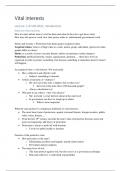Vital interests
Lecture 1, 07-09-2021, Introduction
What are Vital Interests
How do states define what is vital for them and what do they do to get those vitals.
How does this process work, how does power relate to, international governments work.
Safety and security = Protection from harm against acquired values
Acquired values: what is of high value to a state, nation, group, individual, (perceived value,
people differ in values)
Harm: as a result of actors (security threats) and/or circumstance (safety dangers)
Protection: (political) priority, means, organization, attention, … there have to be an
organized in order to protect something. Just because something is important, doesn’t mean it
will happen.
An acquired value = vital interest. Not necessarily
• Has a subjective and objective part
o Subject: something to measure
• Is there a hierarchy of ‘vitalness’?
o IR: survival of the state = highest; but at what cost?
▪ Survival of the state above 100 thousand people?
o Always calculation in it
• Who gets to say what is ‘vital’ (for others)?
o Me: my body is vital, but how about at the state level
o In governance you have to weigh up to others
▪ What is more important
What the state protects? (a temporary definition of vital interests)
• The most basic form of protection: against (external) threats: foreign invaders, public
order, water, disease….
• From the late 19th century onwards the state’s idea of protection becomes more and
more encompassing; add layers of protection
• Protection is always a trade off with freedom
o Covid-19; public health vs freedom
Features of the protective state
• How preventive is the state?
o Eliminating accidents and tragedy, spread of prevention
o Prevention and pre-emption
• The many faces of risk
o The state protects against risk, but also uses it as a governance technique
o Risk and collective vs individual responsibility
, • Security and securitization
o Security as raison d’être of the state, but an expansive concept
o Safety vs security, internal vs external security
Vital Interests: protection as a moving target
• Protection is politics
o Power politics
o Framing and agenda setting
o (international) governance
• Protection is layered
o History adds layers to protection
o Technology adds layers to protection
o Globalization adds layers to protection
→ own dependences and problems
Layers of protection: national, population, and systems security
Globalization and vital interests
• Not all protection can be organized at the national level
o Crisis worldwide (covid/climate/war) needs to be at international level
• Not all vital interests can be achieved at the national level
• International cooperation is sometimes needed to avoid problems (global public bads)
or to safeguard an interest (global public good)
From national to global
• The global arena lacks a government (singular)
• The global arena requires thinking about ‘the public’ (who are the beneficiaries, who
are the free riders)
• What is the global public? Countries? Socio-economic groups? Generations?
Global Public Goods as vital interests
• Starts with “where does one buy a traffic light?”
, o The collective/the state buys and place them
• Global Public Goods (GPGs):
o Benefit a large international public (non-rival and non-exclusive)
o Benefits must be quasi universal in terms of countries, people and generations
Back to basics
• Pure public goods: are non-rivalrous in consumption and non-excludable
• Impure public goods: goods that only partly meet either or both of the criteria
o Clubs goods (non-rivalrous in consumption, but excludable)
o Common pool resources (mostly non-excludable, but rivalrous in
consumption)
Supply problems and collective action problems
• Free rider problem: why contribute if it is non-excludable?
• Tragedy of the commons: why limit yourself if you are not sure others will?
• Prisoners’ dilemma: lack of information leads to a collective suboptimal outcome.
→ Bring in the state! They will solve a lot of collective (not individuals) problems
Definitions of Global Public Goods
A pure global public good is marked by universality – that is, it benefits all countries,
people and generations.
An impure global public good would tend towards universality in that it would benefit more
than one group of countries, and would not discriminate against any population segment or
set of generations.
Nice, if you can get ‘em
• In the absence of a global government, how do we produce GPGs?
o Final global public goods (i.e. the outcomes: environment, peace)
o Intermediate global public goods (i.e. the regimes that work towards the
provision of final GPGs, such as the UN, Paris Climate agreement, protocols,
standards)
• So we negotiate and cooperate (or we fail to)
o Two tier negotiation: among states, and each state with its own constituency
Two main questions for GPGs
• Prioritization: who defines the political agenda, and hence the priorities for resource
allocation?
• Access: who determines whether GPG are in fact accessible to which population
groups?
Politics: who gets what, when and how
(Harold Lasswell, 1936)
, Key questions for this course
Three key questions
1. What is a vital interest and to whom?
2. How are vital interests identified?
3. How do decision-makers priorities and choose which interests to protect?
What is a vital interest and to whom?
• An interest is always an interest to someone (including institutions like the state)
• Who benefits, who doesn’t?
• Who defines? (conflicts/power/calculation/rational bureaucracy/agenda setting…)
How are vital interests identified?
• What is the role of expertise (knowledge, risk assessment, etc.) and instruments in
shaping vital interests?
• What are the challenges in assessing risks and threats? What is the role of likelihood,
probabilities, risk assessment?
• Why do people perceive interests differently?
How do decision-makers priorities and choose which interests to protect?
• Who decides? Who/what do they favour/promote?
• On which basis: risk/vulnerability assessment, political considerations, etc?
How to do well in this course




